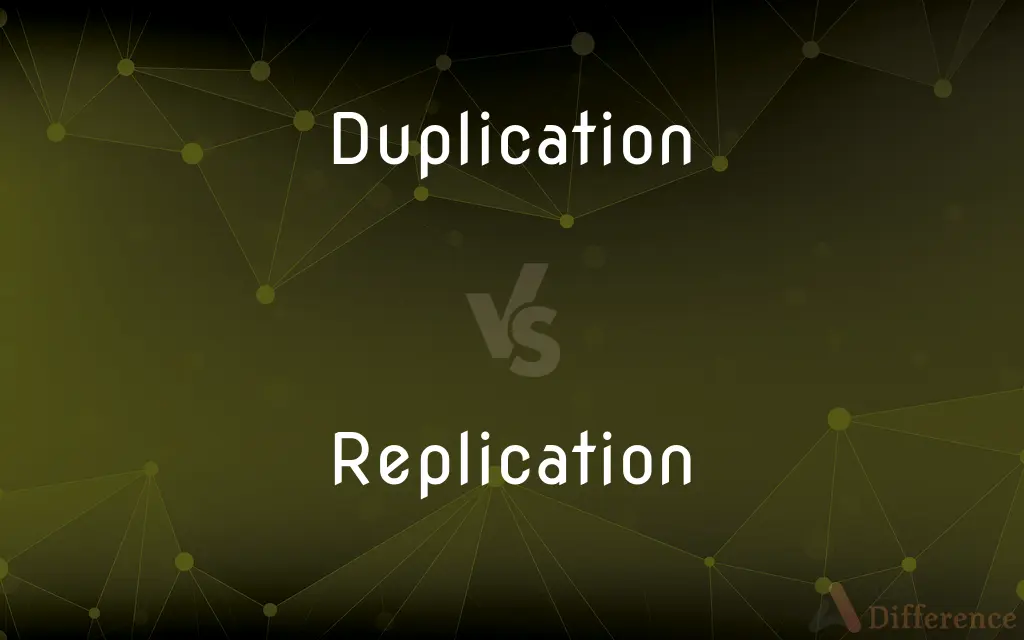Duplication vs. Replication — What's the Difference?
By Tayyaba Rehman — Published on October 8, 2023
Duplication means making an exact copy, while replication refers to the process of reproducing or repeating something.

Difference Between Duplication and Replication
Table of Contents
ADVERTISEMENT
Key Differences
Duplication, at its core, pertains to the act of creating an exact copy of something. This could range from duplicating a document to copying a file on a computer. Replication, on the other hand, has broader connotations.
While it can also mean copying, it frequently refers to the process of reproducing or repeating a procedure, experiment, or any other activity.
Duplication, in many contexts, emphasizes the result — the duplicate. Replication, however, tends to emphasize the process or the repeated activity. This distinction becomes apparent in specialized fields.
For instance, in biology, replication often refers to the process by which DNA makes a copy of itself, while duplication might refer to an event where a segment of DNA is copied more than once. Both terms are integral in various fields, highlighting either the outcome (duplication) or the procedure (replication).
Comparison Chart
Meaning
Making an exact copy
Reproducing or repeating something
ADVERTISEMENT
Focus
Often emphasizes the result
Emphasizes the process
Usage
Common in contexts like document copying
Frequent in scientific processes like DNA replication
Outcome
Results in duplicates
Results in replicas or repeated occurrences
Broader Context
Mostly about physical or digital items
Can refer to procedures, experiments, or activities
Compare with Definitions
Duplication
The act of making an identical copy.
I performed a duplication of the original artwork for display.
Replication
The act of reproducing or repeating.
Scientific studies require replication for validation.
Duplication
Multiplying by copying.
Duplication of resources helped us manage the increased demand.
Replication
In biology, the process by which DNA copies itself.
DNA replication is fundamental for cell division.
Duplication
Creating a backup.
Regular duplication of your documents is a smart precaution.
Replication
Copying with the intent of mirroring the original.
The replication of the sculpture was almost as stunning as the original.
Duplication
Reproducing something exactly.
Duplication of the key was necessary to access the room.
Replication
Mirroring or mimicking a process or activity.
Successful strategies often undergo replication in other departments.
Duplication
Copying information or data.
We avoided data loss through timely duplication of our files.
Replication
The act or process of replicating something.
Duplication
The act or procedure of duplicating.
Replication
(Biology) The process by which genetic material, a single-celled organism, or a virus reproduces or makes a copy of itself.
Duplication
The condition of being duplicated.
Replication
In scientific research, the repetition of an experiment to confirm findings or to ensure accuracy.
Duplication
A duplicate; a replica.
Replication
A copy or reproduction
A replication of a famous painting.
Duplication
The occurrence of a repeated section of genetic material in a chromosome.
Replication
(Law) The plaintiff's response to the defendant's answer or plea; a reply.
Duplication
The formation of such a duplication.
Replication
The process by which an object, person, place or idea may be copied mimicked or reproduced.
Duplication
The act of duplicating.
Replication
Copy; reproduction.
That painting is an almost exact replication of a famous Rembrandt painting.
Duplication
A folding over; a fold.
Replication
(legal) A response from the plaintiff to the defendant's plea.
Duplication
(biology) The act or process of dividing by natural growth or spontaneous action.
Duplication of cartilage cells
Replication
(biology) The process of producing replicas of DNA or RNA molecules.
Duplication
(genetics) The act of copying a nucleotide sequence from one chromosome to another.
Replication
(computing) The process of frequent electronic data copying a one database in one computer or server to a database in another so that all users share the same level of information. Used to improve fault tolerance of the system.
Duplication
(genetics) A nucleotide sequence copied through such a process.
Replication
An answer; a reply.
Withouten any repplicacioun.
Duplication
The act of duplicating, or the state of being duplicated; a doubling; a folding over; a fold.
Replication
The reply of the plaintiff, in matters of fact, to the defendant's plea.
Duplication
The act or process of dividing by natural growth or spontaneous action; as, the duplication of cartilage cells.
Replication
Return or repercussion, as of sound; echo.
To hear the replication of your sounds.
Duplication
A copy that corresponds to an original exactly;
He made a duplicate for the files
Replication
A repetition; a copy.
Duplication
The act of copying or making a duplicate (or duplicates) of something;
This kind of duplication is wasteful
Replication
The copying, by enzymes, of a cell's genome, i.e. the DNA or RNA comprising its genetic material, so as to form an identical genome. This is an essential step in the division of one cell into two. This differs from transcription, which is the copying of only part of the genetic information of a cell's genome into RNA, as in the processes of biosynthesis of messenger RNA or ribosomal RNA.
Replication
The act of making copies;
Gutenberg's reproduction of holy texts was far more efficient
Replication
(genetics) the process whereby DNA makes a copy of itself before cell division
Replication
A quick reply to a question or remark (especially a witty or critical one);
It brought a sharp rejoinder from the teacher
Replication
(law) a pleading made by a plaintiff in reply to the defendant's plea or answer
Replication
The persistence of a sound after its source has stopped
Replication
Copy that is not the original; something that has been copied
Replication
The repetition of an experiment in order to test the validity of its conclusion;
Scientists will not believe an experimental result until they have seen at least one replication
Replication
Creating a duplicate that retains the original's characteristics.
The replication of the experiment produced the same results.
Common Curiosities
How does replication differ in its emphasis compared to duplication?
Replication emphasizes the process of reproducing or repeating, whereas duplication emphasizes the resultant copy.
What does duplication primarily focus on?
Duplication primarily focuses on creating an exact copy of something.
Is duplication always a physical act?
No, duplication can be both physical (like copying a key) or digital (like copying a file).
How is replication relevant in scientific research?
Replication is essential in scientific research to validate findings and ensure consistency across experiments.
How does DNA replication differ from duplication in genetics?
DNA replication is the process by which DNA makes a copy of itself, while duplication in genetics may refer to a DNA segment being copied more than once.
How is replication used in the context of biology?
In biology, replication often refers to the process of DNA copying itself.
Can both terms be used interchangeably?
While they have overlapping meanings, their specific usage might differ based on context, so they're not always interchangeable.
Is replication always an exact copy?
Not necessarily. Replication often aims for accuracy, but depending on the context, slight variations might occur.
In computing, how do the terms differ?
In computing, duplication might refer to creating an exact copy of data, while replication could imply data is copied and synchronized across systems or networks.
What does a duplication process typically produce?
Duplication produces duplicates, which are exact copies of the original.
Does duplication always mean a one-to-one copy?
While duplication often refers to a one-to-one copy, it can also mean creating multiple copies.
Can replication occur in non-physical processes?
Yes, replication can refer to repeated procedures, methodologies, or activities, not just physical copies.
What might be a practical application of duplication?
A practical application of duplication includes creating backups of important documents or data.
If I copy a piece of art, is that duplication or replication?
It can be both; you are duplicating the art by creating a copy, and replicating the style and elements of the original.
Why might a company be interested in replicating a business model?
A company might replicate a successful business model to achieve similar success in a different market or location.
Share Your Discovery

Previous Comparison
Edam Cheese vs. Gouda Cheese
Next Comparison
Orc vs. TrollAuthor Spotlight
Written by
Tayyaba RehmanTayyaba Rehman is a distinguished writer, currently serving as a primary contributor to askdifference.com. As a researcher in semantics and etymology, Tayyaba's passion for the complexity of languages and their distinctions has found a perfect home on the platform. Tayyaba delves into the intricacies of language, distinguishing between commonly confused words and phrases, thereby providing clarity for readers worldwide.
















































